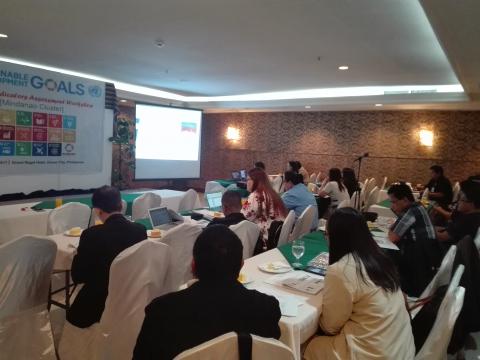Release Date :
Reference Number :
2017-013
 The Philippine Statistics Authority-Regional Statistical Services Office (PSA-RSSO) XI in coordination with Social Sector Statistics Service (SSSS) of PSA Central Office hosted the conduct of the Regional Indicators Assessment Workshop of Sustainable Development Goals (SDGs) for Cluster 3, the Mindanao Group, on December 5-6, 2017 at the Grand Regal Hotel, Davao City with PSA XI as the host region. It was in line with the objective to cascade the initiatives that have been done on SDGs at the national to the subnational level, particularly Regions IX, X, XI, XII, Caraga and ARMM. The activity specifically aimed to:
The Philippine Statistics Authority-Regional Statistical Services Office (PSA-RSSO) XI in coordination with Social Sector Statistics Service (SSSS) of PSA Central Office hosted the conduct of the Regional Indicators Assessment Workshop of Sustainable Development Goals (SDGs) for Cluster 3, the Mindanao Group, on December 5-6, 2017 at the Grand Regal Hotel, Davao City with PSA XI as the host region. It was in line with the objective to cascade the initiatives that have been done on SDGs at the national to the subnational level, particularly Regions IX, X, XI, XII, Caraga and ARMM. The activity specifically aimed to: 1.) conduct data assessment of the Philippine SDG indicators by accomplishing the SDG matrix based on the subnational context;
2.) provide initial proxy indicators – indicators that provide information on a particular territorial contextual aspect (social, environmental, economic). It serves to assess the same contextual aspect as intended by a given common context indicator but for which data is not available. Compared to a common context indicator, a proxy indicator uses either a different definition and/or an alternative data source; and
3.) identify supplemental indicators – indicators that further clarify the initially identified Philippine list of SDG indicators
The workshop in Davao City was attended by officials and staff from the SSSS of PSA Central Office, officials and selected staff of the PSA Regional Statistical Service Offices in Mindanao, members of the Regional Statistics Committee XI, and representatives from the academe in Region XI. On the 1st day of the workshop, Assistant National Statistician (ANS) Wilma A. Guillen of PSA SSSS delivered the challenges and updates on the monitoring of the SDGs while Ms. Bernadette B. Balamban, Chief of Poverty and Human Development Statistics Division of PSA SSSS, gave the workshop objectives and mechanics. The workshop proper followed in the afternoon wherein the participants were grouped by SDG goal and by region. The workshop continued in the morning of 2nd day of the activity. At the end of the workshop, representative from each group presented their workshop outputs. Each group was able to generate the Regional SDG Assessment Matrix with the following information:
1.) Tiers classification of each indicator at the subnational perspective;
2.) Initial proxy indicators;
3.) Supplemental indicators that further clarify the initially identified Philippine list of SDG indicators; and
4.) Issues and other concerns that may be relevant to the SDGs.
The adoption of the Agenda 2030 in September 2015, by the United Nations (UN), represented a firm commitment by the world leaders and UN member states to address the most challenging issues facing the world. In recognition of the need to generate data for the SDGs, in May 2016, the PSA Board approved PSA Board Resolution No. 4, Series of 2016 enjoining all concerned government instrumentalities to provide the necessary data support to monitor the country’s performance vis-à-vis the SDGs based on the indicator framework that shall be determined by the NEDA, PSA and other government agencies. Starting May 2016, the PSA conducted series of technical and multi-sectoral workshops to assess the Global SDG indicators based on the Philippine context. The results of these workshops were used in identifying the Philippine SDG indicators for initial monitoring, which was approved by the PSA Board last May 2017 through the PSA Board Resolution No. 9, Series of 2017.
The monitoring of the SDGs will require the participation of all stakeholders and at all levels to ensure that no one is left behind. The Agenda 2030 also requires collective action in making sure that the agenda is tailored to local needs and priorities. In line with the mainstreaming of the SDGs at the subnational or local development planning and policy formulation, it is imperative to highlight the importance of localizing SDG monitoring, calling for a country-driven consultation process to tailor the global and national indicators to the sub-national. Given the initiative of the PSA in the data assessment of the Global SDG indicators, it was proposed to have cascading of these initiatives at the subnational level by conducting Regional Assessment Workshop of the National SDG Indicators at the Subnational Level on different cluster regions. The regions were clustered into three, namely: Cluster 1 – CAR, NCR, Regions I, II, III, IV-A, IV-B, and V; Cluster 2 - Regions VI, VII, VIII and NIR; Cluster 3- Regions IX, X, XI, XII, Caraga and ARMM.
